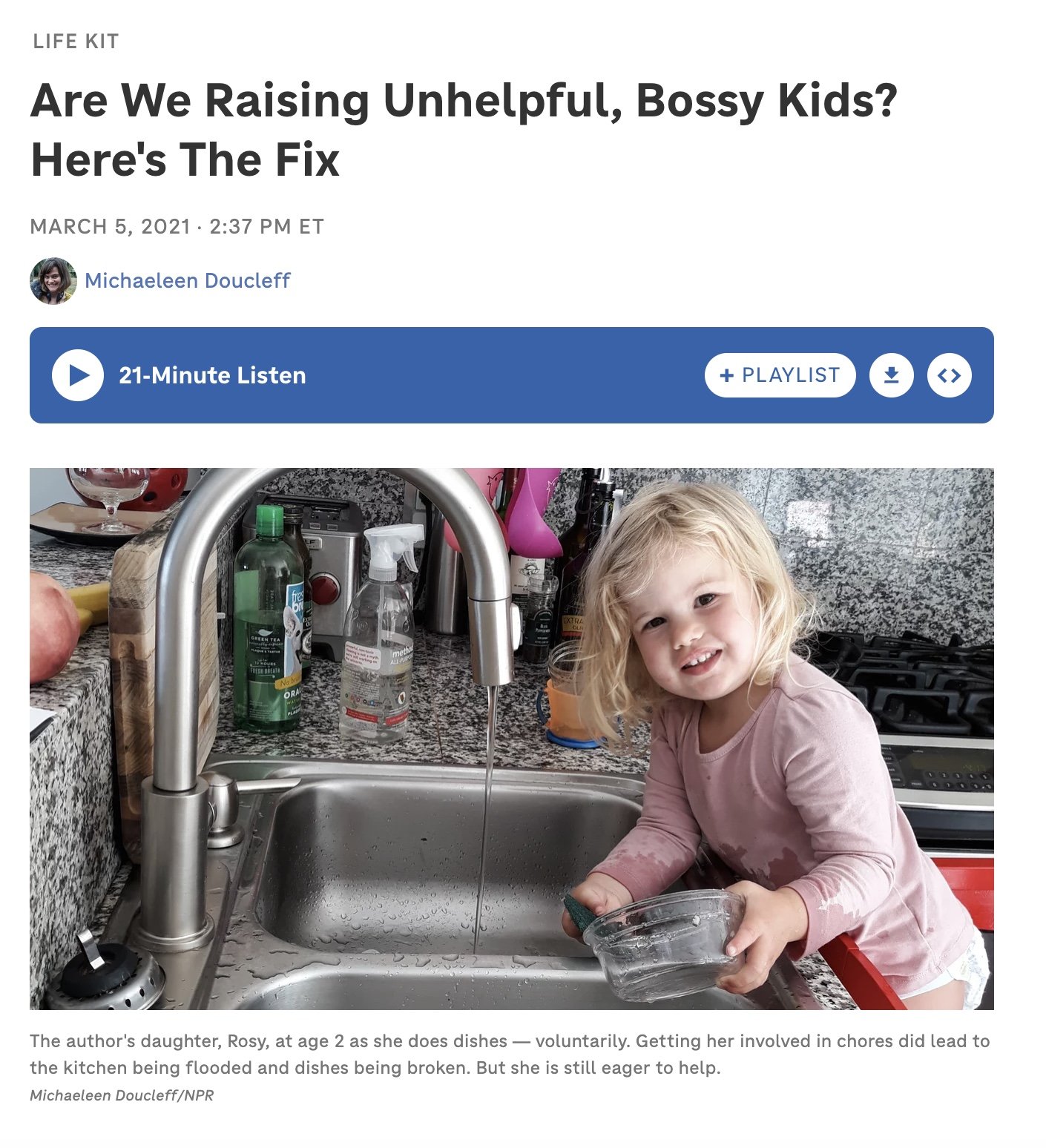Life Kit: Parenting: Raising Kids Who Help With Chores
"Raising Kids Who Help with Chores" is an NPR Life Kit Parenting episode that provides insights and practical advice on how to encourage children to participate in household chores willingly and enthusiastically. Hosted by Maria Godoy and featuring Michaeleen Doucleff, author of "Hunt, Gather, Parent," this episode delves into effective parenting strategies supported by research and real-life experiences.
Content Coverage
The episode emphasizes the natural inclination of young children to help and explores how parents can nurture this tendency. Drawing on research and observations from various cultures, the podcast highlights the significant impact of parental responses on children's willingness to assist with chores. Key insights from psychologist Lucia Alcala, who studies family dynamics in the U.S. and Mexico, underscore the importance of encouraging children's participation from an early age.
Key Takeaways for Parents
Parents can derive several actionable tips from this episode:
Recognize the Natural Helper: Children are born with an intrinsic desire to help. Encouraging this behavior early can foster lifelong cooperation.
Avoid Dismissing Help: Pushing children away when they show interest in chores can diminish their willingness to help over time.
Involve Children in Subtasks: Assign small, manageable tasks to children, allowing them to contribute meaningfully.
Create a Cooperative Environment: Engaging children in family tasks fosters a sense of togetherness and shared responsibility.
Respect Autonomy: If a child refuses to help, avoid forcing them. The goal is to cultivate voluntary cooperation, not obedience.
Critiques of the Episode's Approach
While the episode offers valuable advice, it is not without critiques:
Applicability Across Different Family Dynamics: The strategies discussed may not be universally applicable, as family dynamics and cultural contexts can vary widely. For instance, some families might have multiple children of varying ages, making it challenging to implement a uniform approach. Additionally, cultural norms and expectations around chores can differ significantly. In some cultures, children's participation in household tasks is a given and seamlessly integrated into daily life, while in others, it may be less common or valued differently. Parents might need to adapt these strategies to fit their unique family structure and cultural context, which can require additional effort and creativity.
Developmental Readiness: Not all children may be developmentally ready to handle certain chores, which can lead to frustration for both parents and children. For example, younger children may lack the fine motor skills needed for tasks like folding laundry or washing dishes without making a mess. This can result in parents feeling exasperated and children feeling discouraged if their attempts to help are met with criticism or if they sense they are not meeting expectations. It’s crucial for parents to gauge their child’s developmental stage and assign chores that are appropriate for their abilities to foster a positive and supportive learning environment.
Practical Challenges: Implementing these strategies can sometimes be impractical, especially for parents with demanding schedules or limited support systems. Encouraging children to help and allowing them to learn through trial and error can be time-consuming, and not all parents may have the luxury of time to invest in this approach consistently. The initial stages of teaching and involving children in chores can be messy and slow, which might deter parents who are already juggling multiple responsibilities.
Long-term Consistency: Maintaining consistency in encouraging and involving children in chores over the long term can be challenging. Parents might find it difficult to sustain the level of patience and engagement required, particularly if they do not see immediate results. The temptation to revert to doing tasks themselves for the sake of efficiency can be strong, especially during busy or stressful periods.
Counterpoints
Despite these critiques, the episode provides adaptable strategies that can be tailored to different family environments. The focus on early introduction and positive reinforcement is well-supported by psychological research and practical observations from diverse cultural contexts. Here are a few counterpoints to consider:
Adaptability: The principles discussed in the episode are flexible and can be adjusted to suit various family structures and cultural backgrounds. Parents can start with small, manageable tasks and gradually increase the complexity as children become more competent. This gradual approach allows for customization based on individual family needs and cultural practices.
Developmental Appropriateness: By recognizing that not all children will be ready for the same tasks at the same age, parents can tailor chores to fit their child's developmental stage. This ensures that children feel successful and motivated, rather than frustrated. Simple tasks like fetching items, wiping surfaces, or sorting laundry by color can be appropriate starting points for younger children, building their confidence and skills incrementally.
Long-term Benefits: Investing time in teaching children to help with chores has long-term benefits that outweigh the initial challenges. Children who are involved in household tasks from a young age are more likely to develop a strong sense of responsibility, independence, and cooperation. These skills are invaluable and can positively impact their behavior and attitudes as they grow older.
Creating a Positive Environment: Encouraging children to help and acknowledging their contributions fosters a positive family environment. It helps children feel valued and important, reinforcing their desire to participate and contribute. This cooperative atmosphere can enhance family bonding and create a supportive and nurturing home environment.
Comparison with Other Parenting Resources
Compared to other parenting resources, "Raising Kids Who Help with Chores" integrates practical advice with research-based insights effectively. While books like "The Whole-Brain Child" by Daniel J. Siegel delve deeply into child psychology, this podcast offers a balanced approach, combining theoretical understanding with actionable tips for everyday parenting tasks.
Overall, while there are practical challenges to implementing the strategies discussed in the episode, the potential benefits for both children and parents make it a worthwhile endeavor. By adapting the advice to fit their unique circumstances, parents can successfully cultivate a culture of cooperation and helpfulness within their families.
Affiliate Disclaimer: Some links on our site are affiliate links, which means Modulo may earn a small commission if you purchase through them (at no cost to you). Rest assured, we only recommend resources we’ve rigorously vetted and truly love—affiliate link or not. Thank you so much for supporting our work!








Discover Play The Forest School Way, a must-have for nature-inspired learning, offering creative games and crafts to bring outdoor education to life.